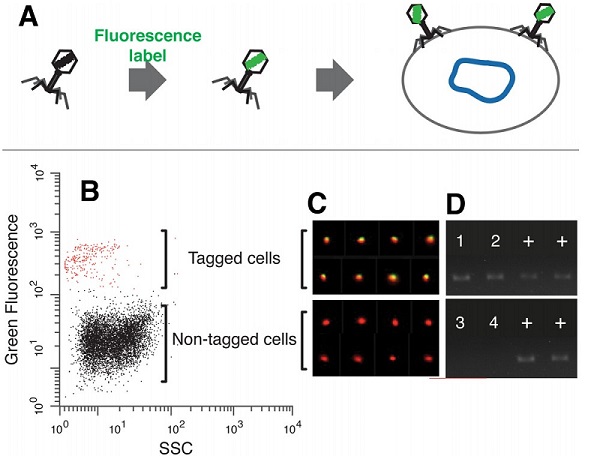Li Deng
Prof. Dr. Li Deng
Institute of Virology
Ingolstädter Landstrasse 1
85764 Neuherberg
Germany
AG Deng
RESEARCH FOCUS
Virus in Nature and Health
The Deng’s lab takes an integrated approach to investigate microbes and viruses interactions by combining microcosm experiments, employing ecological relevant models, with culture-independent methods and high-throughput metagenomics. Our research focus is on virus interactions in the human body (especially lung) and in the environment (especially groundwater).
Viruses, especially (bacterio)phages (viruses infecting bacteria), typically outnumber microbial cells by ~10-fold in aquatic systems, recasting them more recently from environmentally insignificant to the most abundant biological entities on Earth. Viruses are now considered ubiquitous players that impact microbial communities through mortality and horizontal gene transfer to modulate microbial metabolism. During the past years diverse phenomena critical to the biology of microbes has been described to be driven by viruses, especially with respect to rapid environmental changes. The view that viruses are “only” parasites is no longer valid but rather that they are able to transfer and store genetic information of their hosts and influence biogeochemical cycles in ecosystems. Consequently, biogeochemical processes in microbial ecosystems and their potential for novel niche adaptation in response to changing environmental conditions can be understood only when this large dynamic gene pool carried by lytic and temporary viruses is recognized.
Methods developed
Bioinformatic toolbox
Despite growing interest in recent years, studying the virome remains a challenging endeavor due to several reasons, including the scarcity of viral genomic material (compared to microbial and human nucleic acid fraction), small genome sizes of viruses and their low abundance in some cases. In a microbial community only 2–5% of the total DNA is generally of viral origin. Additionally, no conserved gene regions applicable for all viral types have been identified so far. Moreover, many viruses have not been characterized yet and are not included in viral databases. These facts impede straightforward contig assemblages as well as functional annotation of viral genomes and metagenomes.
We built a human virome protein cluster (HVPC) database in order to improve and facilitate functional annotation and characterization of human viromes. This Human Viral Metagenomic Database for Diversity and Function Annotation constitutes of 12 terabases in total, more than 6 Million open reading frames (ORFs), and 927K function clusters. Further improvements such as using machine learning tools (random forest ad neural networks/deep learning) to identify host of viruses using signals including CRISPR, prophages, k-mer, etc. are currently on-going.

Figure 1. Venn diagram showing the distribution of HVPC clusters between different body sites, illustrating that ORFs from the same body site are clustering together (Elbehery et al., 2018, Frontiers in Microbiology).
Viral Tagging (VT)
“Viral-Tagging” (VT) is a high-throughput, culture-independent means of experimentally linking wild viruses to a target host, and vice versa. The DNA of uncultivated viruses is labeled non-specifically with a fluorescent dye, then viruses are mixed with a ‘bait host’, and infected cells are collected by fluorescence-activated flow cytometric sorting. The infecting viral DNA is quantitatively amplified to produce viral-tagged metagenomes. VT enables researchers to broadly map how viruses change over space and time.

Figure 2. Overview of “viral-tagging” technique (Deng et al, mBio2012; Nature 2014; Dzunkova et al, Nature Microbiology, 2019)
HEAD OF THE GROUP
Dr. Li Deng
Research interests: role of viruses in health and environment
ORCID 0000-0003-0225-0663
Curriculum Vitae
· 03/2017-present: Helmholtz Young Investigator. Institute of Virology, Helmholtz Zentrum München, Germany
· 03/2017-present: Junior Fellow. Technical University of Munich, Germany
· 09/2016-present: Emmy Noether Group Leader. Institute of Virology, Institute of Groundwater Ecology, Helmholtz Zentrum München, Germany.
· 09/2015-09/2016: Emmy Noether Research Group Leader, Institute of Groundwater Ecology, Helmholtz Zentrum München, Germany.
· 07/2015-09/2016: Maternity leave
· 12/2011-08/2015: Senior postdoc at the Institute of Groundwater Ecology, Helmholtz Zentrum München, Germany.
· 4/2012-6/2013: maternity leave
· 10/2008-10/2011: Postdoc at the Department of Ecology and Evolutional Biology, University of Arizona, USA.
· 10/2012-8/2011: Visiting Scientist at the Institute of Limnology, University of Innsbruck, Austria.
· 10/2004-10/2008: Ph.D. in Microbiology at the University of Bristol, U.K.
Thesis: Evidence for cyanophage active against bloom-forming freshwater cyanobacteria.
· 10/2003-10/2004: M.Sc. in Environmental Sciences, University of Nottingham, U.K.
8/1998-1/2003: B.Sc. in Biological Sciences and B.Eng. in Environmental Engineering at the Tsinghua University, China.
Open positions
Students looking for an internship, or a host lab to conduct their bachelor’s or master’s thesis are always most welcome in Deng’s lab. If you’re interested, please contact Dr. Li Deng directly.
Leider ist der Eintrag nur auf English verfügbar.
